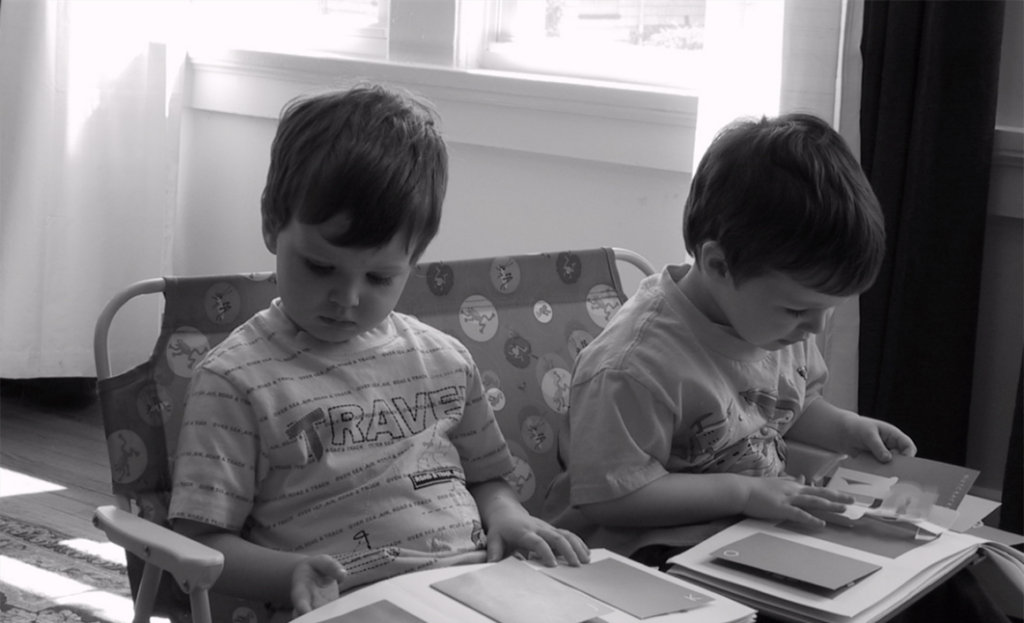Written By: Tracey Tasker, MBA, MA, CCC/SLP

Another reason we need to start working on literacy early is because our world is changing into a digital world. Children are being read to less and spending more time on devices at a young age. In addition, neuroscience research has found that shared storybook reading with young children builds brain connections in the language centers of the brain whereas increased screen time has the opposite effect on the brain. We also know that reading books is a great way to build vocabulary as children are exposed to words that represent things they might not see in their daily environment.
Emergent literacy is especially important for some of our most vulnerable young children, as only 11% of students with disabilities and 10% of multilingual learners are reading proficiently by 4th grade. Children with other disabilities in addition to language, such as Deaf/Hard of Hearing or Blind/Visually Impaired are often not receiving the same level of literacy intervention. Parents and professionals are unaware of how to introduce these children to literacy. There are many resources freely available that can assist professionals and parents in how to modify books and individualize literacy interventions for children with multiple disabilities. There are also many resources available to provide multilingual learners with books in their home language and strategies to facilitate meaningful connections between English and their primary home language.
Would you like to learn strategies and get book recommendations for emergent literacy? Join me for my virtual live Summit course, Emergent Literacy on September 28th, 2024, where we will review family-friendly emergent literacy strategies and discuss choosing and modifying books to engage young children.
CLICK HERE to view Tracey Tasker’s Instructor Page.
References:
American Speech-Language Hearing Association. (2001). Roles and responsibilities of speech-language pathologists with respect to reading and writing in children and adolescents [Position Statement].
Cole, P., Trexberg, K., & Schaffner, M. (2023). State of Babies Yearbook: 2023. https://stateofbabies.org/
Gregory, L. (2023, March 8). Early learning standards by state. Mybrightwheel.com. https://mybrightwheel.com/blog/early-learning-standards
Hutton, J. S., Dudley, J., Horowitz-Kraus, T., DeWitt, T., & Holland, S. K. (2020a). Associations between home literacy environment, brain white matter integrity and cognitive abilities in preschool-age children. Acta Paediatrica (Oslo, Norway: 1992), 109(7), 1376–1386. https://doi.org/10.1111/apa.15124
Hutton, J. S., Dudley, J., Horowitz-Kraus, T., DeWitt, T., & Holland, S. K. (2020b). Associations between screen-based media use and brain white matter integrity in preschool-aged children. JAMA Pediatrics, 174(1), e193869. https://doi.org/10.1001/jamapediatrics.2019.3869
Justice, L. M., & Kaderavek, J. (2002). Using shared storybook reading to promote emergent literacy. Teaching Exceptional Children, 34(4), 8–13. https://doi.org/10.1177/004005990203400401
NAEP reading: Reading highlights 2022. (n.d.). Nationsreportcard.gov. Retrieved August 9, 2024, from https://www.nationsreportcard.gov/highlights/reading/2022/
Read Aloud 15 MINUTES Survey Report How America Reads Aloud to its Children. (2018). https://www.readaloud.org/documents/ReadAloudSurveyReport.pdf
Save the Children US Department of Education and Child Development. (2013). Emergent LItearcy Investing Early for Exponential Outcomes. https://resourcecentre.savethechildren.net/
About Summit Professional Education
Summit equips therapists with better continuing education courses that provide CEUs while impacting patient outcomes. Find high-quality on-demand CE along with the largest offering of live options — including live webinars, live streams, and in-person courses. Want to deep dive on a topic? Summit offers hundreds of 6-hour courses for the most in-depth learning!